book4unit4reading
人教版高一英语 必修 4 Unit 4 reading 知识点总结(51张)
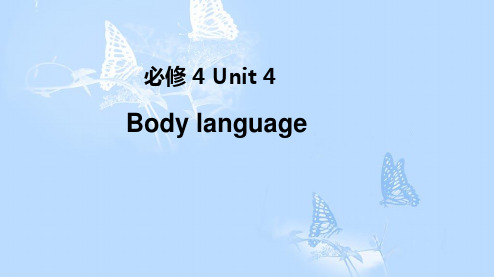
(2)representation n.
表现;描述,描绘
(3)representative n.
代表
adj. 典型的,有代表性的
[温馨提示] 同义词表示“代表”:on behalf of, stand for。
【活学活用】 (1)The museum had several paintings representing the artist's early style. 博物馆藏有几幅代表这个艺术家早期风格的油画。 (2)The chairman represented the importance of the bill to the audience. 主席向听众说后置定语 ___T__h_e__fi_r_s_t_p_e_r_s_o_n__t_o_a_r_r_i_v_e___ (第一个到达的人) was Tony Garcia from Colombia, closely followed by Julia Smith from Britain. 2.not all…表示部分否定,意为“并非所有的” ___N__o_t_a_l_l_c_u_l_t_u_r_e_s_g_r_e_e_t__e_a_c_h__o_th__e_r_t_h_e__sa__m_e__w__a_y____ (各种文化背景下的人互致问候的方 式不尽相同), nor are they comfortable in the same way with touching or distance between people.
(3)语法填空。 ①The subject is so difficult;I really don't know how to represent it___t_o___ you. ②The study was carried out in one small town, so we couldn‘t be sure that the results were truly _r_e_p_r_e_s_e_n_t_a_t_iv_e___(represent). ③The competition attracted over 500 players___r_e_p_r_e_s_e_n_t_i_n_g____ (represent) eight different countries.
译林版高中英语选必四Unit4 Reading I 教案

《英语》(选择性必修·第四册)Unit 4Never too old to learnReading II. Learning objectivesBy the end of the lesson, students will be able to:1. grasp the topic and the general idea of the lesson;2. understand some important details;3. form their own opinions based on the magazine article.II. Key competence focus1. Learn how to use the given information to express oneself.2. Learn how to get a deep understanding of the reading material.III. Predicted area of difficulty1. Using the features of procedural texts to understand the text.2. Using the means of development of a paragraph to understand the text.3. Free discussion about the questions in A3P46.4. Some inferences based on the magazine article.IV. Teaching proceduresStep 1 Welcoming to the unit1. T greets the class.T: Class begins, boys and girls! Good morning/afternoon!T: Open your book at page 43. Let’s have a look at the picture on this page. What do you see on it? T: Right. An old lady is reading a book attentively.T: Look through a few more pictures in this unit and you’ll know something about the topic of the unit: Further learning. The theme of the unit is included in the title “Never too old to learn”. T: Different people learn in different ways. Read the leaflet at page 43 and discuss the questions in pairs.T: What is your learning style?Sample answer:I am a visual learner. I learn best from videos, pictures, diagrams, charts and other visual cues. I understand the information better and remember it more clearly when it is presented to me this way.T: Do you think your learning style will change as you continue your education?Sample answer:I don’t believe that my visual learning style will change into the auditory or physical style.T: Why?Sample answer 1:Visual learning presents subject knowledge in a better way for me to learn, helps me improvemy powers of concentration and encourages me to be creative. I have been using this learning style for a long time, so it is the one that I am most comfortable with and the one I find benefits me the most. For these reasons, I believe my main learning style will not change.Sample answer 2:I think that my learning style will change because as a person and a learner I am always changing too. My current learning style is visual, and I like reading my study materials and writing summary notes that I can study from later. However, I don’t mind trying other learning styles if they help. I find that I also enjoy listening to podcasts and I am able to learn and remember a lot from them, so perhaps in the future I will also use the auditory style more often. 【设计意图:提示学生翻阅44、45和50图表,帮助学生形成本单元的主题概念。
book4_unit4_reading人教版高中英语必修四第四单元
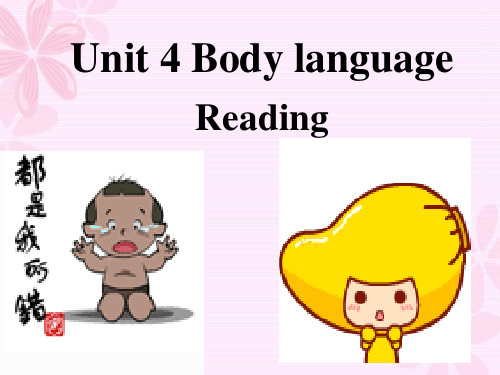
languages are bad. F
5.All members of a culture behave in the
same way.
F
TASK 3:Answer the following questions
1. Is the author of this passage male or female? How do you know ? 2.What were the two mistakes that the author noticed? 3.How can we understand “These actions are not good or bad”?
Fill in the blanks
Body language is used by people for sending messages to one another. In many countries in
the world, men k_is_s__ each other when they meet. In Britain, people usually s_h_a_k_e_ hands
think deeply
stomachache go this way
【课堂互动探究】
Look at the pictures. What are the following ways of communicating?
gesture
posture
facial expression eye contact
Para.1
ParSt.u2mmaDriizfefetrheentmsatuindeidnetas haaccvoerddiifnfegrteont (Parat.h2e-3m) eagnreinetginagndcuksetyomweorrsd. s.
Unit4Reading教学设计牛津译林版七年级英语下册

译林版7B Unit4 Reading I:A trip to the zoo教学设计一、课题(学科和年级)译林版七年级下册Unit4 Finding your way Reading I : A trip to the zoo 二、教材分析本课时选自译林版初中英语七年级下册第四单元《Finding your way》Reading 第一课时,属于第一模块“家和社区”这个主题,与学生的日常生活紧密联系,学生兴趣浓厚。
本课时中,导游通过展示地图向学生们讲解如何游览动物园,从而让学生能根据地图识路,掌握方位的基本表达方法,同时让学生了解到动物园常见动物的名称及基本习性。
三、学情分析授课对象为初一的学生,受生源影响,学生英语水平参差不齐,基础比较薄弱,因此在教学过程中,布置的任务难度降低,并且要兼顾到每个层次的学生,使他们都要有所收获。
四、目标预设1.掌握以下单词、词组及句型并能熟练朗读和运用。
词汇:everybody, straight, bamboo, along, road, king, remember, dangerous, sound, forest, funny, laugh, giraffe, quite, neck,leaf, northeast, bridge, cross词组:like to eat bamboo, lie down all day long, e here to see them, make beautiful sounds, jump around, make people laugh句子:Go straight on, and you’ll find the Panda house.Walk along the road.Turn left, and to the west of the Lions’ Area, you’ll find theWorld of Bird.Northeast of the giraffes there’s a bridge.Cross the bridge, and you’ll see the elephants. Have a nicetrip!2.能根据地图识路, 掌握方位的基本表达方法。
book4unit4warming up &reading
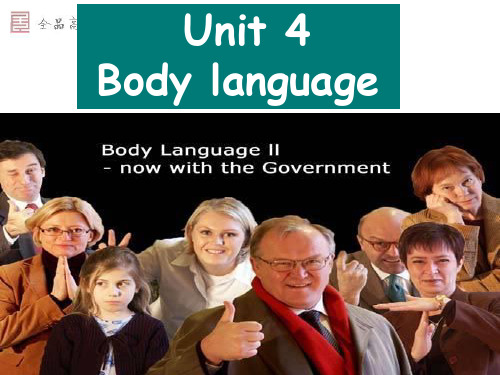
Answer questions
1.Why are the people visiting China? 2.Why is Julia Smith surprised? 3.What do French people often do when they meet people they know? 4.Why do you think we need to study body language?
gestures
OK
stop
silent
well done
Facial expressions
happy
angry
sad
confused
postures
She is feeling ill / having a stomachache.
He is thinking deeply.
eye contact
Ahmed Aziz
China
Columbia Britain Japan Canada Jordan France
Akira Nagata
Tony Garcia
George Cook
Julia Smith
Darlene Coulon
Fast reading
Divide the passage into four parts and match the main idea of each part.
Some body language is different in different countries.
What do people usually do when meeting? In China, Britain In Russia, France, In Arab, Japan, Korea In Some western countries Shake hands Kiss Bow hug
综合英语教程第四册4单元4-04-Part 3
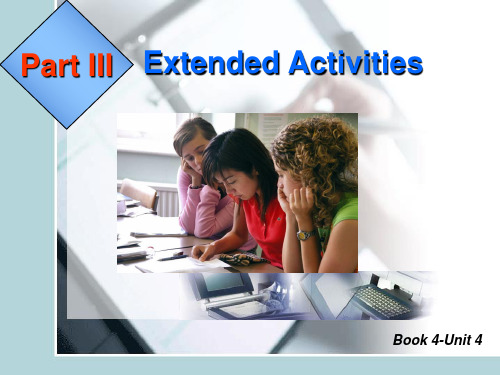
Book 4-Unit 4
The Iceberg Principle
Hemingway is famous for his Iceberg Principle, that is, to present the story with simple sentences and dialogues and leave a large space for readers to explore, to reflect. It was just like the iceberg, which had only one-eighth part on the water and seven-eighths part under the water.
The main working corollary of Hemingway’s “iceberg principle” is that the full meaning of the text is not limited to moving the plot forward: there is always a web of association and inference, a submerged reason behind the inclusion (or even the omission) of every detail.
Book 4-Unit 4
Summary of the Story
The story is about an American couple that spends their holidays in an Italian hotel. It is a __ra_i_n_y_ day and the American woman sees _a__ca_t_i_n_th_e__ra_i_n_, which she wants to protect from the raindrops. When she goes out of the hotel, which is kept by an old __It_a_li_an__ who really seems to do everything to please that woman, and wants to get the cat, it is gone. After returning to the hotel room, she starts a conversation with __h_e_r_h_u_s_b_an_d___, who is __r_e_a_d_in_g__ all the time, telling him how much she wants to have a cat and other things, for instance _h_e_r_o_w_n__si_lv_e_r_to__e_a_t _w_it_h. Her husband seems to be annoyed by that and not interested at all. At the end of the story there is a knock on the door and the maid stands there holding a cat for the American woman in her hands.
大学英语4课文翻译及课后习题答案
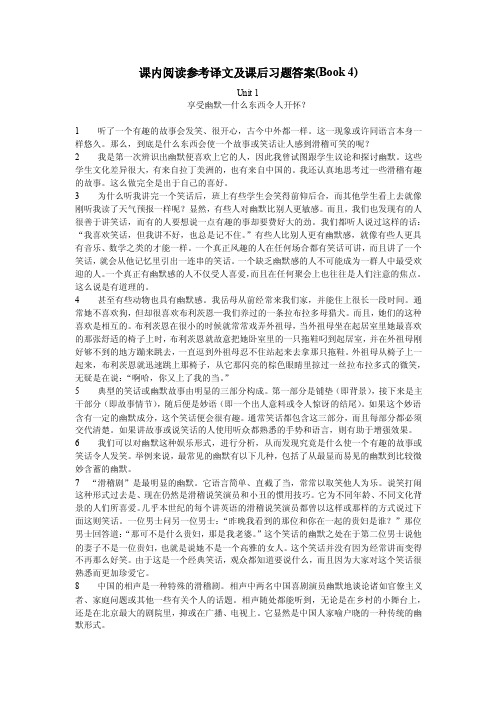
课内阅读参考译文及课后习题答案(Book 4)Unit 1享受幽默—什么东西令人开怀?1 听了一个有趣的故事会发笑、很开心,古今中外都一样。
这一现象或许同语言本身一样悠久。
那么,到底是什么东西会使一个故事或笑话让人感到滑稽可笑的呢?2 我是第一次辨识出幽默便喜欢上它的人,因此我曾试图跟学生议论和探讨幽默。
这些学生文化差异很大,有来自拉丁美洲的,也有来自中国的。
我还认真地思考过一些滑稽有趣的故事。
这么做完全是出于自己的喜好。
3 为什么听我讲完一个笑话后,班上有些学生会笑得前仰后合,而其他学生看上去就像刚听我读了天气预报一样呢?显然,有些人对幽默比别人更敏感。
而且,我们也发现有的人很善于讲笑话,而有的人要想说一点有趣的事却要费好大的劲。
我们都听人说过这样的话:“我喜欢笑话,但我讲不好,也总是记不住。
”有些人比别人更有幽默感,就像有些人更具有音乐、数学之类的才能一样。
一个真正风趣的人在任何场合都有笑话可讲,而且讲了一个笑话,就会从他记忆里引出一连串的笑话。
一个缺乏幽默感的人不可能成为一群人中最受欢迎的人。
一个真正有幽默感的人不仅受人喜爱,而且在任何聚会上也往往是人们注意的焦点。
这么说是有道理的。
4 甚至有些动物也具有幽默感。
我岳母从前经常来我们家,并能住上很长一段时间。
通常她不喜欢狗,但却很喜欢布利茨恩—我们养过的一条拉布拉多母猎犬。
而且,她们的这种喜欢是相互的。
布利茨恩在很小的时候就常常戏弄外祖母,当外祖母坐在起居室里她最喜欢的那张舒适的椅子上时,布利茨恩就故意把她卧室里的一只拖鞋叼到起居室,并在外祖母刚好够不到的地方蹦来跳去,一直逗到外祖母忍不住站起来去拿那只拖鞋。
外祖母从椅子上一起来,布利茨恩就迅速跳上那椅子,从它那闪亮的棕色眼睛里掠过一丝拉布拉多式的微笑,无疑是在说:“啊哈,你又上了我的当。
”5 典型的笑话或幽默故事由明显的三部分构成。
第一部分是铺垫(即背景),接下来是主干部分(即故事情节),随后便是妙语(即一个出人意料或令人惊讶的结尾)。
Unit 4 Reading 知识点讲解课件-高中英语牛津译林版(2020)必修第一册
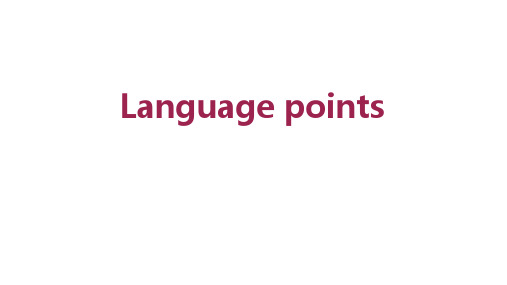
(1)have an effect on/upon…
对……有影响
bring/put…into effect
使生效;实行;实施
come into effect
生效,开始实施
in effect
有效;在实施中;实际上
side effect
副作用
(2)effective adj.
有效的;生效的
表示“实际上”的表达还有:in fact,in reality,in practice, as a matter of fact, in truth, in essence等。
基础自主梳理
a society 5. _w__h__e_r_e______being thin is often seen as being
beautiful, teenagers sometimes turn to extreme methods to slim down quickly. Health experts are increasing their efforts to educate teens about the side effects of losing weight too quickly. An expert said, “It is normal for teenagers to be 6.
____s_l_i_g_h__t_ly_____(slight) overweight. Teenagers are still growing and 7. ___t_h__e_i_r_____(they) bodies need a lot of nutrition to function well. If they do not take 8. __i_n___enough
高中英语Book4Unit4-Reading-(1)

Read it silently..
1.How do men from Jordan greet others ?
To men: stand close, and shake hands
To women: nodding
2. Is the author male or female? How do you know?
Find out the two cultural mistakes in Para2 Read it by yourself.
The first mistake
Tony Garcia (Columbia )
Julia Smith (Britain)
He approached Julia, _to_u__ch__ed__ _h_e_r__ __sh__o_u_ld_e_r_and __k_i_ss_e_d_ her on the __c_h_e_e_k__.
Summary
II. Decide if the following statements are true (T) or false (F).
1. Englishmen often stand close to others or touch strangers as soon as they meet. F
Male.Because Ahmed Aziz only shakes
hands with men.
3. How did Tony and Darlene greet each other?
They shook hands and then kissed each other twice on each cheek, and this is the French custom when adults meet people they know.
牛津译林版英语八年级下册Unit4 Reading 教材知识详解

Unit4 Reading 教材知识详解1. After our ship crashed against the rocks, I swam as far as I could.当我们的船撞到岩石损坏之后,我奋力前游。
crashed是动词crash的过去式。
crash用作不及物动词,意为“碰撞,倒下,坠落,(飞机)坠毁”。
如:The plane crashed in the mountains.那架飞机在山中坠毁了。
as.. as one can/could 表示“尽某人所能……”,相当于as... as possible。
如:Please come as early as you can.=Please come as early as possible.请尽量早点儿来。
2. By the time, I finally felt the land under my feet, I was tired out.等到我终于感觉到脚下的陆地时,我已筋疲力尽。
(1) by the time意为“到……时为止”,引导时间状语从句。
如:By the time I came in, Tom had written his name on the blackboard.当我进来时,汤姆已经把他的名字写在黑板上了。
(2) be tired out意为“筋疲力尽的”。
be tired of意为“对……感到厌烦,厌倦”。
I was tired out when we got back from the long climb.我们长途爬山回来时,我感到筋疲力尽。
Kitty was tired of eggs.基蒂厌倦了吃鸡蛋。
3. I woke up as the sun was rising...当太阳升起时我醒了过来……as连词,意为“当……的时候,随着”,引导时间状语从句。
如:As time goes on, he knows his students.随着时间的推移,他了解了他的学生rising是动词rise的现在分词。
新课标人教版必修四Book4 Unit4 Reading
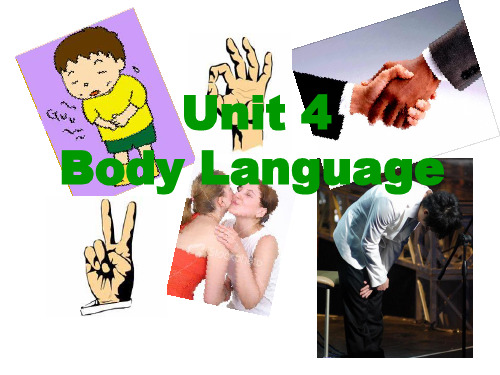
Ways to greet each other Approach others closely and are more likely to touch them. Shake hands, do not stand very close to others or touch strangers when they meet. Bow Shake hands. Shake hands and stand quite close to other men. Nod to women but do not shake hands with them.
我的课堂我做主
Assignment(任务分配)
Group1. → Question (3,4). Group2. → Question (5). Group3. → Question (1). Group4. → Question (2). Group5. → Question (6). Group6. → Question (7).
Japan: bow
Some western countries: hug
Russia, France, Arab: kiss
Reading
Communication:
No problem?
Learning aims
• 1、To learn some new words and phrases. • 2、To know different body languages represent different meanings. • 3、To respect other country’s body languages.
Why do we need to study body language?
人教版选择性必修第四册Unit4 Reading and Thinking
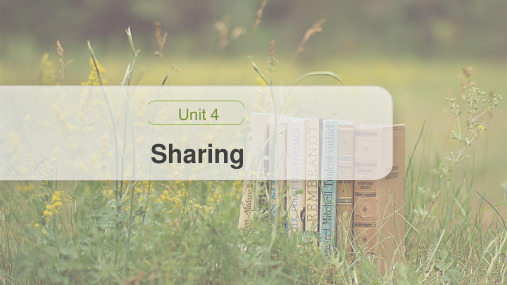
[名师点津] not to mention“更不用说”,相当于一个插入语,但其后所接 的词的形式要求与前面的词平行一致,一般用于否定句之后。表达“更不用 说”的短语还有:①let alone ②not to speak of。
Sometimes I wonder how relevant chemistry is to these students—few
(1)I’ve heard that,in the Sahara,there is no shade during the day,and the stars seem especially brilliant on clear nights. 我听说在撒哈拉,白天没有阴凉之处,在晴朗的夜晚星星看起来格外灿烂。 (2)Water is usually warmer in direct sunlight than in the shade . 水通常是在阳光直射的地方比在阴凉处温度高。 (3)Its long branches and leaves shade them from/against the sun. 它长长的树枝和树叶为他们遮挡了阳光。 (4)I saw that merchant sitting under the shade of a tree,reading a book. 我看见那个商人坐在树荫下读书。
Unit 4
Sharing
内容索引 Period Two Reading and Thinking—Language Points
1. parcel
2. jam 3. mail
4. clay 5. weed
基 础 自 测 自主学习 落实基础知识
n.包裹 vt.裹好;打包 n.果酱;堵塞 n.邮件;信件;邮政 vt.邮寄;发电邮给 n.黏土;陶土 n.杂草;野草 vt.& vi.除杂草
新标准大学英语综合教程4(unit1-6)课后答案及课文翻译
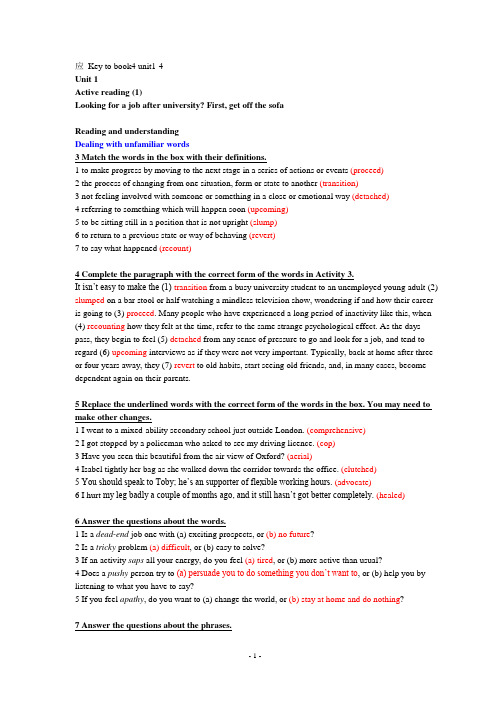
应Key to book4 unit1-4Unit 1Active reading (1)Looking for a job after university? First, get off the sofaReading and understandingDealing with unfamiliar words3 Match the words in the box with their definitions.1 to make progress by moving to the next stage in a series of actions or events (proceed)2 the process of changing from one situation, form or state to another (transition)3 not feeling involved with someone or something in a close or emotional way (detached)4 referring to something which will happen soon (upcoming)5 to be sitting still in a position that is not upright (slump)6 to return to a previous state or way of behaving (revert)7 to say what happened (recount)4 Complete the paragraph with the correct form of the words in Activity 3.It isn‘t easy to make the (1) transition from a busy university student to an unemployed young adult (2) slumped on a bar stool or half watching a mindless television show, wondering if and how their career is going to (3) proceed. Many people who have experienced a long period of inactivity like this, when (4) recounting how they felt at the time, refer to the same strange psychological effect. As the days pass, they begin to feel (5) detached from any sense of pressure to go and look for a job, and tend to regard (6) upcoming interviews as if they were not very important. Typically, back at home after three or four years away, they (7) revert to old habits, start seeing old friends, and, in many cases, become dependent again on their parents.5 Replace the underlined words with the correct form of the words in the box. You may need to make other changes.1 I went to a mixed-ability secondary school just outside London. (comprehensive)2 I got stopped by a policeman who asked to see my driving licence. (cop)3 Have you seen this beautiful from the air view of Oxford? (aerial)4 Isabel tightly her bag as she walked down the corridor towards the office. (clutched)5 You should speak to Toby; he‘s an supporter of flexible working hours. (advocate)6 I hurt my leg badly a couple of months ago, and it still hasn‘t got better completely. (healed)6 Answer the questions about the words.1 Is a dead-end job one with (a) exciting prospects, or (b) no future?2 Is a tricky problem (a) difficult, or (b) easy to solve?3 If an activity saps all your energy, do you feel (a) tired, or (b) more active than usual?4 Does a pushy person try to (a) persuade you to do something you don‘t want to, or (b) help you by listening to what you have to say?5 If you feel apathy, do you want to (a) change the world, or (b) stay at home and do nothing?7 Answer the questions about the phrases.1 Is fork out (a) a formal, or (b) an informal way of saying to pay for something?2 If you are in the same boat as another person, are you (a) making the same journey together, or (b) in the same difficult or unpleasant situation?3 If you feel you have come full circle, do you (a) feel you are back where you started, or (b) feel a sense of satisfaction because you have completed something?4 If someone takes a soft line, do they deal with a person (a) in a kind and sympathetic way, or (b) in a lazy way without making a decision?5 If you strike the right note about something, are you expressing yourself (a) well, or (b) badly?6 If you do something by all means, do you (a) try your best to do it, or (b) not care about it?7 If you nudge someone back into the saddle, are you encouraging them to (a) take responsibility again, or (b) take it easy?8 If you talk through a problem with someone, do you (a) examine it carefully and sensitively, or (b) refer to it quickly and then change the subject?Active reading (2)If you ask meDealing with unfamiliar words4 Match the words in the box with their definitions.1 funny or entertaining (amusing)2 used for emphasizing that something good has happened, especially because of good luck (fortunately)3 an amount of money that a person, business or country borrows, usually from a bank (loan)4 to take an amount or number from a total (deduct)5 the most exciting, impressive, or interesting part of an event (highlight)6 to show that you understand someone‘s problems (sympathize)7 needing a lot of time, ability, and energy (demanding)5 Complete the conversation with the correct form of the words in Activity 4.A After three years at university, I‘m now quite heavily in debt.B I (1) sympathize with you, I know what it‘s like to have financial problems. But (2) fortunately I didn‘t need to take out a student (3) loan when I was at university, because I had a part-time job.A What did you do?B I worked in a restaurant at weekends.A That must have been very (4) demanding.B Yes, it was. I had to get the right balance between work and study. But the other people who worked there were good fun to be with, so it was quite (5) amusing too. The (6) highlight of the weekend was always Saturday night when we worked overtime.A But I don‘t expect you made a lot of money?B No, there wasn‘t much after they‘d (7) deducted tax and pension contributions. But it was enough to keep me going.6 Replace the underlined words with the correct form of the words in the box. You may need to make other changes.1 When I was at college I kept all my personal things in an old cupboard.2 A lot of people who leave university before getting a degree end up in good jobs.3 I think she‘ll get a good degree, but I wouldn‘t risk my money on the exact result.4 The money I spent at college was more than what I earned in my part-time job.5 The chances of my being offered a job after that interview must be quite remote.6 Our business has done very well since we changed our advertising.7 I think telling the truth and not cheating is always the best policy.Key:(1) belongings (2) dropouts (3) gamble (4) exceeded (5) odds(6) has thrived (7) honesty7 Answer the questions about the words and expressions.1 If something is not all it’s cracked up to be, is it (a) valid and interesting, or (b) just a little bit disappointing?2 If someone keeps banging on about something, are you likely to be (a) interested in, or (b) bored by what they say?3 If there is a lot of hassle in your life, are you likely to feel (a) stressed, or (b) relaxed?4 If something happens out of the blue, is it (a) unexpected, or (b) part of your plan?5 If you say you ended up in a particular job, do you suggest that (a) you have fulfilled your ambition, or (b) it happened almost by chance?6 Are the regulars in a pub (a) the customers who come very often, or (b) the food the pub offers most often?7 If something is dead easy, is it (a) very easy, or (b) not easy at all?8 If you treat someone to something, do you (a) buy something nice for them, or (b) behave badly to them?9 If you cheer a place up, do you (a) make the place look brighter, or (b) make the people in the place happier?Reading and interpreting8 Look at the sentences from the passage and identify the style features.1 Twelve years at school and three years at university, teachers banging on about opportunities in the big wide world beyond our sheltered life as students, and what do I find?This shows the informality of an incomplete sentence in the first part, the use of an informal expression (banging on) and a rhetorical question to the reader (What do I find?)2 Try as I might to stay cheerful, all I ever get is hassle, sometimes with people (especially boys, god, when will they grow up?) …This has the use of an informal word (hassle), an informal exclamation (god) and a question to the reader (When will they grow up?)3 Actually, I had my eye on the course at the London School of Economics (LSE).Here there is a discourse marker typical of speech (Actually) and an informal phrase (had my eye on).4 I kind of understand it, and not just because my degree is in economics.Here ―kind of‖ is a sort of discour se marker of informal speech (showing something is general, vague or not definite).5 I wanted something in finance and investments, because you know, maybe with a job like that, Icould use my degree.This has a discourse marker of informal speech (you know).6 ... it‘s true, he really did seem to have three hands.Again here is a discourse marker of informal speech (it‘s true).7 I talked to him about ... well, about pretty well everything …This has another discourse marker of informal speech (well) and an informal phrase (pretty well). Language in useword formation: compound nouns1 Write the compound nouns which mean:1 a degree which is awarded a first class (a first-class degree)2 work in a hospital (hospital work)3 a ticket for a plane journey (a plane ticket)4 a discount for students (a student discount)5 a pass which allows you to travel on buses (a bus pass)6 a room where an interview is held (an interview room)7 a period spent in training (a training period)word formation: noun phrases2 Write the noun phrases which mean:1 a career which is rewarding from the financial point of view (a financially rewarding career)2 legislation which has been introduced recently (recently introduced legislation)3 instructions which are more complex than usual (unusually complex instructions)4 an institution which is orientated towards academic (academically orientated work)5 work which makes physical demands on you (physically demanding work)6 information which has the potential to be important (potentially important information)7 candidates who have been selected after a careful procedure (carefully selected candidates)8 a coursebook in which everything has been planned beautifully (a beautifully planned textbook)try as … might3 Rewrite the se ntences using try as … might .1 I‘m trying to fill this last page, but I just can‘t think of anything.Try as I might to fill this last page, I just can‘t think of anything.2 I try to be friendly with Marta, but she doesn‘t seem to respond.Try as I migh t to be friendly with Marta, she doesn‘t seem to respond.3 I try hard to get to sleep, but I can‘t help thinking about my family.Try as I might to get to sleep, I can‘t help thinking about my family.4 He just doesn‘t seem to get the promotion he deserve s, even though he keeps trying.Try as he might, he just doesn‘t seem to get the promotion he deserves. / Try as he might to get the promotion he deserves, he just doesn‘t seem to get it.5 I keep trying to remember her name, but my mind is a blank.Try as I might to remember her name, my mind is a blank.given that …4 Rewrite the sentences using given that …1 Since I know several languages, I thought I would look for work abroad.Given that I know several languages, I thought I would look for work abroad.2 Xiao Li has the best qualifications, so she should get the job.Given that Xiao Li has the best qualifications, she should get the job.3 Since we‘re all here, I think it would be a good idea to get down to some work.Given that we‘re all here, I thin k it would be a good idea to get down to some work.4 Since it‘s rather late, I think we should leave this last task until tomorrow.Given that it‘s rather late, I think we should leave this last task until tomorrow.clauses introduced by than5 Rewrite the sentences using clauses introduced by than .1 She‘s experienced at giving advice. I‘m more experienced.She‘s less experienced at giving advice than I am. / I‘m more experienced at giving advice than she is.2 You eat too much chocolate. It isn‘t good for you.You eat too much chocolate than is good for you.3 She worked very hard. Most part-timers don‘t work so hard.She worked harder than most part-timers do.4 You have arrived late too many times. That isn‘t acceptable.You have arrived late more times than is acceptable.5 I don‘t think you should have given so much personal information. It isn‘t wise.I think you have given more personal information than is wise.collocations6 Read the explanations of the words. Answer the questions.1 highlight A highlight is the most exciting, impressive, or interesting part of an event.(a) What would you like to be the highlight of your career?I would like the highlight of my student career to be to receive a national award for the best student research project.(b) How can you highlight an important sentence in a text?You can underline it in pencil or pen or you can use coloured pens or highlighters.(c) What are the edited highlights of a football match?The highlights are when someone scores a goal or prevents one from being scored.2 loan A loan is an amount of money someone borrows from someone else.(a) Have you ever taken out a loan?No, I haven‘t. But my parents have taken out several loans to buy kitchen equipment.(b) What is the best way to pay off a loan?It is best to pay a loan off quickly, although you will still have to pay some interest.(c) If you have a library book on loan, what do you have to do with it?You have to return it before the date it is due, otherwise you may have to pay a fine.3 thrive To thrive means to be very successful, happy or healthy.(a) What sort of business thrives best in your part of the country?In my part of the country, light industries and electronics companies thrive.(b) Which sort of plants thrive in a hot climate?In a hot climate you can see tropical fruit and vegetables thrive and also tropical plants and trees. (c) Why do you think some couples thrive on conflict?It is difficult to understand why some couples thrive on conflict. Maybe each one wants to compete with the other or maybe they enjoy ―kissing and making up‖ after the conflict.7 Translate the paragraphs into Chinese.If you ask me, real life is not all it‘s cracked up to be. Twelve years at school and three years at university, teachers banging on about opportunities in the big wide world beyond our sheltered life as students, and what do I find?Try as I might to stay cheerful, all I ever get is hassle, sometimes with people (especially boys, god, when will they grow up?), but mostly with money. It‘s just so expensive out here! Everyone wants a slice off you. The Inland Revenue wants to deduct income tax, the bank manager wants repayments on my student loan, the landlord wants the rent, gas, water, electricity and my mobile bills keep coming in, and all that‘s before I‘ve had anything to eat. And then some bright spark calls me out of the blue, asking if I‘m interested in buying a pension. At this rate, I won‘t even last till the end of the year, let alone till I‘m 60.(☞翻译时可以根据上下文增译,即增加原文暗含了但没有直接表达出来的意思。
Unit 4 Reading and Thinking高中英语人教版(2019)选择性必修第一册
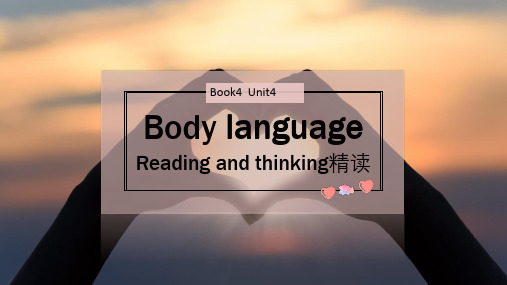
Body language
Reading and thinking精读
Learning Objectives
1.To learn some important language points 2. To anlyse difficult and important sentences propely. 3. To use some important points in senteces.
即学即用 单句语法填空
1. They discussed _v_a_r_i_o_u_s___(vary) matters all over the world.
2. Many graduates seek employment in engineering , aviation,
education, medicine and a wide __v_a_r_ie_t_y_______(vary) of other
vary /ˈveəri/ vi. (根据情况)变化;改变
vary
_v__a_ri_e_t_y____ n. 变化;多样性;不同种类 _v__a_r_i_o_u_s___ adj. 不同的;各种各样的
___________ 各种各样的;不同种类的
a variety of / varieties of
读一读 细观察 1. In the lab, don’t touch anything without your teachers’ permission.
词性__名__词____ 含义__允__许__,__许__可__ 2. You’re not allowed to park here unless you have a permit.
Unit4ReadingTeenfaintsafterskippingmeals教学设计高中英语牛津

5). predict which meal she skipped? How long has she skipped meals?
To arouse students’interests about this topic.
To create a context and lead to the topic.
3). What was the result?
3.After reading para.24, the teacherwould guide students to think about these following questions.
1). Do you think only Jennifer or only girls lose weight like this?
2.Students read this passage and fill in this form.
details
Who
What
When
Where
Why
1). Who is the main character?
2). What happened to her or him?
3). When did this happen?
Why:the author hopes students understand that being healthy is being beautiful, and teenagers need to choose healthy ways to bee beautiful.
How:the news report goes based on Jennifer’s story of losing weight which reveals the social phenomenon that in our society, most people think being beautiful is being thin. However, health experts suggest that teenagers should choose healthy ways to bee beautiful.
- 1、下载文档前请自行甄别文档内容的完整性,平台不提供额外的编辑、内容补充、找答案等附加服务。
- 2、"仅部分预览"的文档,不可在线预览部分如存在完整性等问题,可反馈申请退款(可完整预览的文档不适用该条件!)。
- 3、如文档侵犯您的权益,请联系客服反馈,我们会尽快为您处理(人工客服工作时间:9:00-18:30)。
confused
happy
Be quiet , please
Let’s look at the following gestures.
ok
stop
victory / peace
I love you!
Good!
Thumbs up
Bad
Thumbs down
Good luc k!
Keeping his fingers crossed
(Para 1)
Part 2:
(Para2-3)
Part 3:
(Para 4)
Part 4:
(Para 5)
A. Summary of body language
B. To meet the international students at the Capital international Airport
everyone to men to women
people she knows
Para4-5: 1.Who seemed to prefer to keep more physical distance from others? Who seemed to prefer closer physical distance?
One form of communication without using any words. It is the use of actions, gestures, postures and facial expressions to convey emotions.
What do these mean? surprised
Name Description
Tony Garcia
man from Colombia
Julia woman from
Smith Akira
Nagata George
Cook
Britain man from Japan
man from Canada
Ahmed man from
Aziz
Jordan
Darlene Coulon
woman from France
Body Language
kiss on the cheek no touching
To Whom everyone
everyone
bowing
everyone
shaking hands shaking hands
nodding shake hands and kiss twice on each cheek
Putting the fingers
on the chest Me?
Come here! Moving his hand up and down with the palm facing up
Shrugging his shoulders I don’t know!
COMMUNICATION: NO PROBLEM!
Fast Reading
Skim the text quickly and answer the following question.
1. What does the text mainly tell us about?
It tells us the importance of “Body Language” and the differences of “Body Language” between different cultures.
Para2-3: Find out the two mistakes (misunderstandings).
The first mistake
Mr. Garcia from
(Columbia)
He approaches Ms Smith by _to_u_c_h_i_n_g_h_e_r_ _s_h_o_u_l_d_e_r_ and k_i_s_s_ed__
2. We can divide it into 4 parts according the paragraphs included in each partand match the main idea of each part
Part 1:
Unit 4 Body language
Warming-up Warming up
1.What do you think is the
purpose of language? To communicate with each other.
Warming-up
2.What do you think “Body language” means?
C. To introduce the students to each other and explain their different ways of greeting D. Different people have different body language.
Careful reading & details
The second mistake
Akira from (Japan)
George Cook
from (Canada)
He _b_o_w__e_d__ to Mr. Cook and his nose _t_o_u_c_h_e_d__ Mr. Cook’s _m__o_v_in_g_ __h_a_n_d__.
He _r_e_a_ch__ed__ __h_is___ __h_a_n_d_
__o_u__t __ to the
Japanese.
a Japanese
George Cook (Canada)
Julia Smith (Britain)
Mr. Garcia (Columbia)
Complete the chart.
her on the _c_h__e_e_k__.
Julia Smith from
(Britain)
She _s_te_p_p_e_d_ _b_a_c_k__ appearing _s_u_r_p_r_is_e_d_ and put up _h_e_r_h_a_n_d_s__ as if _i_n__d_e_fe_n_c_e___.
